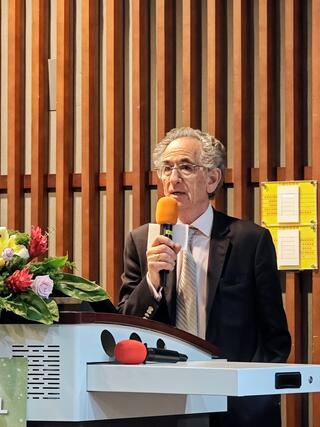We are sad to share news of the death of our valued colleague, Prof Josef W Konvitz. We are grateful to Prof Mike Osborne for sharing this piece written to honour the significant contributions made by Prof Konvitz.
JOSEF W KONVITZ, 1946-2025
(contributed by Mike Osborne and Chris Shepherd)
Josef Konvitz died in Paris on the 16 June 2025 after a short illness. He is survived by his wife Isa, sons Eli and Ezra and grandson Wolf. He was laid to rest at the Pere-Lachaise Cemetery, Paris on the 19 June attended by his family, friends and former colleagues. Josef was described by his sons as intelligent, slightly mischievous, and sometimes even emotional but most of all clear sighted.
Josef, an only child, was born at Doctors Hospital in New York City in 1946. When he was a month old, his father took up a position in the Law School at Cornell University and was also a founding member of the New York State School of Industrial and Labor Relations at the university. So Josef grew up in Itaca, New York. He developed an early interest in history. He held degrees from Cornell University (BA with Honours in History, 1967), and Princeton University (PhD in History, 1973), and was the recipient of several prizes, and fellowships, including from the Woodrow Wilson Center (1987), and the National Endowment for the Humanities (1979 and 1987). He was was one of earliest researchers to focus on Food History, writing several scholarly articles on the topic, and later he made contributions to the history of technology. Back in the 1970s and 1980s, formulating histories of different subjects was rare. Josef also had an important role in the formulation and realisation of the encyclopaedic History of Cartography (Harley & Woodward) although, because of the demands of the position he later took up at the OECD, did not contribute to the written content nor, though approached, did he become one of a editors.
He became a professor in the History Department at the Michigan State University (1973-1992) where he wrote on topics such as Cities and the Sea: Port City PIanning in Early Modern Europe, and The Urban Millennium: The City-Building Process from the Early Middle Age to the Present. He then went on to take up a role as a consultant at the OECD in Paris and subsequently he became a permanent member of staff. He was Head of Division for Urban Affairs (1996-2003) and of the Regulatory Policy Division (2003-2011).
At the OECD, he directed reviews of urban policy in Japan and Germany, a series of Urban Renaissance reviews and case studies on learning city-regions, the Ecological City project, the OECD-Australia Conference on Cities and the New Global Economy, and studies on distressed urban areas and urban indicators. As Head of the Regulatory Policy Division, he designed and implemented a strategic, multi-disciplinary and cross-sectoral programme to strengthen regulatory quality and regulatory reform. He led the preparation of two sets of OECD principles on regulatory policy, and the OECD-APEC Guidelines on Regulatory Reform. He directed OECD country reviews of regulatory reform of Russia, China, Japan, Korea, Mexico, Viet Nam, Australia, and assessments of 24 members of the European Union. In 2004 he helped establish the OECD’s programme of co-operation with countries in North Africa and the Middle East, and thereafter worked closely with Morocco, Tunisia, Lebanon, the Palestinian Authority and Israel. In both urban affairs and regulatory policy programmes, he integrated multi-level governance into the design and implementation of national policies.
After retirement he became Honorary Professor of Education within the College of Social Sciences at the University of Glasgow, where he was known as the most active honorary professor in the college. There he was a regular contributor to the work of the college through offering seminars, masterclasses and speeches at conferences. He served on the advisory boards of the Centre for Sustainable, Healthy and Learning Cities and Neighbourhoods, the Urban Big Data Centre, and Policy Scotland. He continued his scholarly work, publishing amongst other things, two major books, Cities in Crisis (Manchester University Press 2016) and the two volume Cities, Citizenship and Jews in France and the United States, 1905–2022 (Routledge 2023/2024).
He also was Visiting Professor King’s College London (2012-14) providing teaching modules on problem-solving innovation strategies, and organizing a high-level seminar on public and private sector co-operation,
In 1998, Josef was part of a team studying Learning Cities and Regions within a series of five city-regions in Europe and later one in Australia. At the conclusion of the Australian study Josef and the then Vice Chancellor of RMIT, Professor Ruth Dunkin, concluded that the Learning Cities model needed an Observatory to share best practice around the world. This was the birth of the PASCAL Observatory. The first Chair of PASCAL was the newly retired Head of the Centre for Educational Research and Innovation (CERI) at the OECD, Dr Jarl Bengtsson and he was succeeded as Chair by Josef Konvitz upon his retirement in 2011. Thereby he returned to the organisation he cofounded, which by this time had re-located its European centre to the University of Glasgow. From this time onwards he was unrelenting in his advocacy for PASCAL around the world, and lead the observatory from the front.
Following his retirement Josef Konvitz decided to remain in Paris and became a French citizen along with his wife Isa. He continued to write, travel, lecture and advise, including providing significant support for PASCAL.
Only a few days before he was hospitalised, Josef was leading and finessing the final draft for the candidature of Rachi de Troyes, lieu de mémoire européen to receive the Label du Patrimoine européen from the European Commission. That candidature is the French government's submission for this prestigious designation. Sadly he did not receive that final honour.
He will be missed by all who knew him.
Gallery images (click to enlarge):
Discussion topics:
- Log in to post comments















Latest Comments